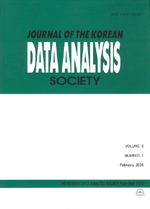기업의 사회적 책임활동과 회사채 신용등급
The Effect of CSR on Corporate Bond Grade
- 한국자료분석학회
- Journal of The Korean Data Analysis Society (JKDAS)
- Vol.17 No.1
-
2015.02279 - 291 (13 pages)
- 73

기업의 사회적 책임(CSR)에 대한 관심의 증가는 투자자들에게 CSR에 기초한 사회책임투자의 중요성을 일깨우고, CSR과 재무성과의 관계를 조사한 다양한 연구로 이어졌다. 기존 연구들은 회계적 성과와 주식성과로써 재무성과를 측정하였으나, 이들 지표는 CSR의 기업성과에 미치는 장기적인 영향력을 측정하기에는 적절하지 않다. 본 연구는 이런 문제점을 완화하기 위한 방안으로 CSR과 회사채 신용등급간의 관계를 조사한다. 회사채 신용등급은 신용평가회사가 장기적인 안정성을 평가한 등급이므로 CSR의 장기적인 영향력 파악에 적합한 성과지표이다. 또한 회사채 신용등급은 타인자본비용을 대리하므로 CSR의 타인자본비용에 효과 또한 파악가능하다. 회사채 신용등급은 한국신용평가회사의 회사채 신용평가정보를, CSR는 경제정의연구소의 KEJI지수를 사용한다. OLS 회귀분석을 실시하여, CSR성과가 높은 기업의 회사채 신용등급이 우수하다는 실증결과를 발견한다. 즉, CSR이 기업성과에 장기적으로 긍정적인 효과가 존재함을 의미한다. 또한 회사채 신용등급 상승으로 기업들은 타인자본비용 감소효과도 획득하고 있다. OLS회귀분석 외에 순위로짓(ordered logit) 회귀분석을 추가로 실시하고 동일한 결과를 재확인한다. 한국신용평가 외에 나이스신용평가, 한국기업평가의 회사채 신용등급을 이용한 분석에서도 실증결과에 변함이 없어, 분석결과의 강건성이 확보된다.
A lot of firms interest in CSR activities, which are able to improve the relationship with stakeholders. The increase in CSR causes investments on stock such as SRI (social responsible investing) and studies on the association between CSR and firm value. Firm value is usually measured as accounting based performance and stock market based performance. These measures are irrelevant to reflect firm performance in long term perspective. This research tries to examine the effect of CSR on corporate bond grade to reduce the weakness from measures of firm performances. Bond grade produced by credit rating agency is appropriate to evaluate the long-term firm performance and good proxy variable of the cost of debt. KEJI index is employed for proxy variable of CSR and corporate bond grade evaluated by KIS ratings is adopted. OLS regression and ordered logit regression analyses are performed to investigate the association between CSR and bond grade. Empirical results from both regression analyses support the positive effect of CSR on bond grading. This implies that CSR is an influential factor to reduce cost of debt. Regression results using corporate bond grades from two other rating agencies -NICE rating and Korea ratings- show unchanged results.
1. 서론
2. 선행연구 및 가설설정
3. 연구 설계
4. 실증분석
5. 결론
References
(0)
(0)